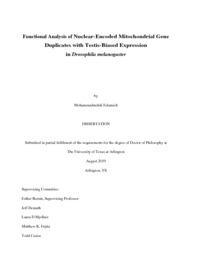
ATTENTION: The works hosted here are being migrated to a new repository that will consolidate resources, improve discoverability, and better show UTA's research impact on the global community. We will update authors as the migration progresses. Please see MavMatrix for more information.
Show simple item record
| dc.contributor.advisor | Betrán, Esther | |
| dc.creator | Eslamieh, Mohammadmehdi M | |
| dc.date.accessioned | 2022-01-20T17:34:11Z | |
| dc.date.available | 2022-01-20T17:34:11Z | |
| dc.date.created | 2019-08 | |
| dc.date.issued | 2019-08-12 | |
| dc.date.submitted | August 2019 | |
| dc.identifier.uri | http://hdl.handle.net/10106/30145 | |
| dc.description.abstract | Most of the genes encoding proteins that function in the mitochondria are located in the nucleus and are called nuclear-encoded mitochondrial genes (N-mt genes). In Drosophila melanogaster, most of the tissue-specific duplicated N-mt genes have acquired testis-biased expression. These genes appear to be older and relocated more often than other duplicated genes and have energy-related functions. These patterns reveal strong selection for the retention of new genes for male germline mitochondrial functions. Maternal inheritance of mitochondria and male-male competition for fertilization are two common forces that might drive changes in mitochondrial functions. We analyzed N-mt genes in the human genome to test the presence of this pattern in other species. We find that about 18% of human N-mt genes fall into gene families, but unlike in Drosophila, only 28% of the N-mt duplicates have tissue-biased expression and only 36% of these have testis-biased expression. To study the function of the Drosophila testis-biased duplicates, we knocked down 39 N-mt duplicated genes with testis-biased expression in D. melanogaster. Multiple RNAi lines and a few TRiP-CRISPR knockout lines were used to study the fertility effects of these genes. Forty-nine percent of the RNAi knockdowns in germline showed male sterility and seventy-two percent of TRiP-CRISPR knockout lines and all few previously published knockout studies confirmed these results. We have failed to find any evidence of the parental gene being able to compensate for the N-mt duplicated gene in the fertility effects. These effects along with the different pattern of expression that leads to the presence of these genes in the sperm proteome/mitochondria, their protein divergence, and positive selection inferred for some of these genes suggest that the new duplicate genes have a different function than their parental genes during spermatogenesis and/or in sperm. We also produced a knockout mutant for Cytochrome c oxidase 4-like (COX4L) in D. melanogaster to understand the function of this new gene in detail. The knockout strain for this gene was generated using CRISPR-Cas9 technology. The knockout of COX4L produce completely sterile males unlike the knockdown that produced partial male sterility and reveals that knockdown results might have milder phenotypes than knockouts as expected. A lack of sperm individualization is observed in those males. The male infertility is rescued by driving COX4L-HA in the germline. In addition, ectopic expression of COX4L in soma caused embryonic lethality as expected, if COX4L has a specialized male germline function. Overexpression of COX4L in male germline leads to a reduction in male fertility revealing that fine tuning of the expression of this gene is needed. Several stainings revealed that the mitochondria of COX4L-KO are not functional and the ROS production in the testes was higher than in controls which might explain the male sterility of these flies. This prominent phenotype along with having energy-related functions, testis-biased expression, and also being present in the Drosophila sperm proteome database supports the idea that males might use different mitochondria in their germline and/or sperm. | |
| dc.format.mimetype | application/pdf | |
| dc.language.iso | en_US | |
| dc.subject | Nuclear-encoded mitochondrial genes | |
| dc.subject | Gene duplication | |
| dc.subject | Male-biased expression | |
| dc.subject | Human | |
| dc.subject | Drosophila melanogaster | |
| dc.subject | COX4L | |
| dc.subject | ROS | |
| dc.title | Functional Analysis of Nuclear-Encoded Mitochondrial Gene Duplicates with Testis-Biased Expression in Drosophila melanogaster | |
| dc.type | Thesis | |
| dc.degree.department | Biology | |
| dc.degree.name | Doctor of Philosophy in Quantative Biology | |
| dc.date.updated | 2022-01-20T17:34:11Z | |
| thesis.degree.department | Biology | |
| thesis.degree.grantor | The University of Texas at Arlington | |
| thesis.degree.level | Doctoral | |
| thesis.degree.name | Doctor of Philosophy in Quantative Biology | |
| dc.type.material | text | |
Files in this item
- Name:
- ESLAMIEH-DISSERTATION-2019.pdf
- Size:
- 4.602Mb
- Format:
- PDF
- Name:
- Results-Gal4-Actin5c-August201 ...
- Size:
- 35.35Kb
- Format:
- Microsoft Excel 2007
- Name:
- Results-Gal4-Bam-27-25c-Summer ...
- Size:
- 30.51Kb
- Format:
- Microsoft Excel 2007
- Name:
- Viability -Gal4-Actin5c-25c-De ...
- Size:
- 684.3Kb
- Format:
- Microsoft Excel 2007
- Name:
- Viability -Gal4-Actin5c-27c-De ...
- Size:
- 654.5Kb
- Format:
- Microsoft Excel 2007
- Name:
- Viability -Gal4-Actin5c-29c-August ...
- Size:
- 495.6Kb
- Format:
- Microsoft Excel 2007
- Name:
- Fertility -Gal4-Bam-27_25c-201 ...
- Size:
- 708.3Kb
- Format:
- Microsoft Excel 2007
This item appears in the following Collection(s)
Show simple item record


